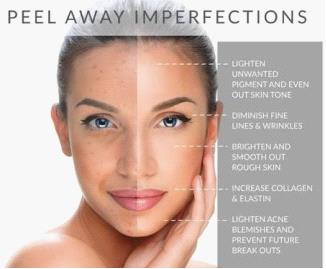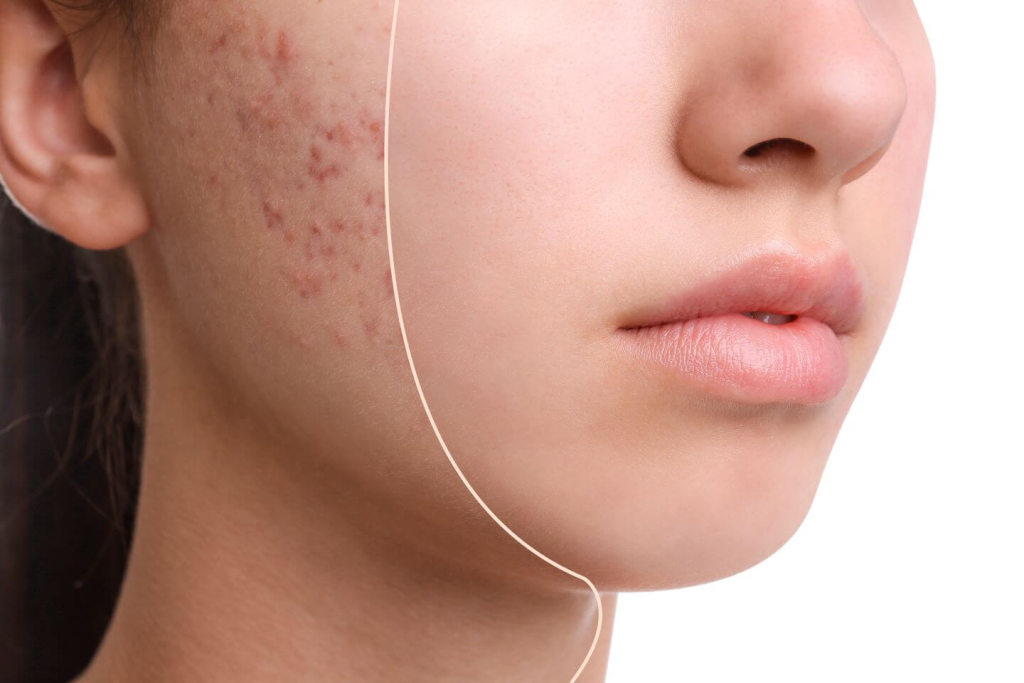Chemical peels are a popular and effective way to improve skin health and combat the signs of aging. As we grow older, our skin can become dull, rough, and discolored, making us look older than we feel. Chemical peels can help with a variety of skin issues, including age spots, uneven texture, acne, hyperpigmentation, and aging symptoms brought on by sun damage or blemishes.
One of the key benefits of chemical peels is their ability to increase skin cell turnover rate, which essentially brings new, fresh skin cells to the surface. This can help to rejuvenate the skin, leaving it looking smoother, softer, and more youthful. Chemical peels can also help to reduce the appearance of fine lines, wrinkles, and dark spots, as well as clear up breakouts and blemishes.
One popular chemical peel solution that is highly recommended is a formula that combines nourishing ingredients, lactic acid, salicylic acid, and resorcinol. These ingredients work together to gently exfoliate the skin and promote cell turnover, resulting in a more radiant complexion. This type of chemical peel is suitable for most skin types and can produce dramatic results with regular use.
How Long After Accutane Can You Get a Chemical Peel
Accutane, also known as isotretinoin, is a powerful medication used to treat severe acne that has not responded to other treatments. It works by reducing the amount of oil produced by the skin’s oil glands, which helps prevent acne from forming. Due to its potent nature, Accutane can have long-lasting effects on the skin, including increased sensitivity and thinning of the skin. Because of this, it is important to wait a period of time after finishing Accutane treatment before undergoing certain skin procedures, such as chemical peels.
After completing a course of Accutane, dermatologists typically recommend waiting at least 6-12 months before getting a chemical peel. This waiting period allows the skin to fully recover and rebuild its natural barrier function, reducing the risk of complications such as scarring, hyperpigmentation, or excessive irritation. It is crucial to follow your dermatologist’s guidance and not rush into any treatments that could potentially harm your skin.
Popular Chemical Peel Products on Amazon
- Trusted recommended item: Skin Obsession 40% Glycolic Acid Peel for Acne, Scars, Age Spots & Lines
- Top-rated pick: The Ordinary AHA 30% + BHA 2% Peeling Solution
- Best value: QRxLabs Chemical Peel Neutralizer – post-peel PH balancing with chamomile and green tea extracts
Chemical peels are skin treatments that involve applying a chemical solution to the skin to remove the top layers of damaged or aged skin. They can help improve skin texture, reduce the appearance of fine lines, acne scars, and hyperpigmentation, and promote collagen production for a more youthful complexion. However, it is crucial to use caution when considering a chemical peel after Accutane treatment.
Due to the sensitivity of the skin post-Accutane, it is essential to consult with a board-certified dermatologist before undergoing any skin procedures. They can assess your skin’s condition, recommend the appropriate type of chemical peel, and determine the optimal timing for the treatment. By following their guidance and waiting the recommended timeframe, you can safely enjoy the benefits of a chemical peel without compromising the health of your skin.
Benefits of a Chemical Peel include:
- Improve skin color, clarity, tone and texture
- Stimulate new collagen and healthy skin cell growth, resulting in a radiant complexion
- reduce sun-related discoloration.
- Help to clear up breakouts
- Smooth away the look of fine lines and wrinkles
- Increased hydration of the skin
- Address visible skin imperfections, acne scars, and deeper scars
- Enable skincare products used at home to be more effective because a peel can remove several layers of skin build-up and congestion, allowing products to penetrate deeper into the skin

Skin Looks Worse After Chemical Peel
Contra-Indications of a Chemical Peel:
- If you are lactating, pregnant or think you might be pregnant, you can NOT receive a chemical peel.
- If you are taking a doctor prescribed acne medication, such as Isotretinoin or Accutane, you must discontinue use for at least 6 months prior to a chemical peel.
- If you are using a prescribed exfoliant such as Retin-A®, Renova®, Differin®, Tazorac®, Avage® or a high percentage Glycolic Acid product, discontinue use for approximately 10 days prior to your chemical peel. Please consult your physician before discontinuing the use of any prescription medication.
- If you have active herpes simplex (cold sores) on treatment area, you can NOT receive a chemical peel.
- If you have sun “allergies”, you can NOT receive a chemical peel unless cleared by Dr.Chow. You may need a prescription for HSV Prophylaxis.
- If you are allergic to aspirin, you can NOT receive a chemical peel.
- If you have had any prior adverse reaction to a skin peel, you can NOT receive a chemical peel.
- If you had recent radiation treatment for cancer, you can NOT receive a chemical peel.
- If you have had sunburn, significant sun exposure or wind-burn within the last 2 weeks, you can NOT receive a chemical peel.
- If you have had surgery within the last month in the area to be peeled, you can NOT receive a chemical peel.
- If you are currently using antibiotics (which may cause skin to be ultra-sensitive), you can NOT receive a chemical peel.
- If you have waxed your face, you must wait at least 72 hours before receiving a chemical peel.
- If you are using a chemical depilatory treatment, you must wait a week prior to receiving a chemical peel.
- If you have received a cosmetic or resurfacing skin procedure, such as laser or a chemical treatment, you must wait 2 weeks prior to receiving a chemical peel.
- If you have received Botox® or another injectable procedure, you must wait 2 weeks prior to receiving a chemical peel.
Recovery Info
There are many products available on Amazon that have received excellent reviews and user recommendations if you want to incorporate a chemical peel into your skincare routine. Some popular options include:
1. Jan Marini Skin Research Transformation Face Serum: This serum contains a blend of glycolic acid, salicylic acid, and retinol to exfoliate the skin and improve texture and tone.
2. PCA SKIN Sensi Peel: This gentle chemical peel is formulated with lactic acid and niacinamide to improve skin tone and reduce the appearance of fine lines and wrinkles.
3. Murad Rejuvenating AHA Hand Cream: This hand cream contains glycolic acid to exfoliate and soften the skin, making it an excellent choice for addressing age spots and rough texture.
Chemical peels are a valuable tool for maintaining skin health and combating the signs of aging. By incorporating a chemical peel into your skincare routine, you can achieve smoother, more radiant skin and address a variety of common skin concerns. Consider trying a chemical peel with proven ingredients like lactic acid, salicylic acid, and resorcinol to see the transformative effects for yourself.
After a Chemical Peel
- Never pick or pull shedding skin, allow skin to naturally slough off.
- Do not apply any medications following treatment not recommended by your esthetician, including AHA products.
- Avoid direct sun exposure for at least 2 weeks to prevent hyperpigmentation.
- Always wear a sunscreen (minimum SPF 30) to minimize possible sun damage.
- Keep treated area moisturized for the duration of the peeling process by applying a slightly thicker moisturizer.
- It is ideal to let the skin stabilize and rest overnight, but mineral makeup can be applied following the treatment if absolutely necessary.
- Do NOT go to a tanning booth for a least three weeks before or after a treatment.
- Discontinue the use of Retin-A®/Renova® or Differin® for seven days after treatment.
- Do not have electrolysis, collagen injections, Botox, threading, facial waxing for approximately seven days after treatment.
- Do NOT apply ice or ice water to the treated areas.
- Do NOT participate in activities that would cause excessive perspiration.
- STAY COOL! Getting overheated internally can cause hyperpigmentation.
- Do NOT go swimming for a week.
- Do NOT have any electrolysis, collagen, Botox® or other dermal filler injections for a week.
- Do NOT have any facial waxing or use depilatories for a week after treatment
Chemical Peel Before and After
Many people struggle with acne and are considering getting on Accutane. While using Accutane as a skin treatment is often an effective way to cure severe cystic acne, it also comes with a host of potentially dangerous side effects. Many people refrain from taking Accutane because of these side effects and are willing to try alternate treatments in hopes of treating acne. Listed below are four facial treatments that are worth considering before beginning Accutane.
1. Retinol topical/Vitamin A: Retinol and Vitamin A are helpful topicals to apply to the skin and assist in treating acne. Before resorting to Accutane, try retinol, retinoid acid cream or serum, or even prescription Tretinoin. Retinols and retinol derivatives come in many forms, including toners, gels, creams and ointments, which assist the skin in getting rid of dead skin cells. Retinols also help to boost the production of new skin cells and help control oil regulations. As new cells generate, they push the old dead cells out along with bacteria that block pores and contribute to breakouts and problematic skin issues.
2. HydraFacial: The HydraFacial is a treatment worth considering before Accutane because of the immediate and long-term benefits that it brings to the skin. The automated vortex used during treatment thoroughly cleanses the pores by using technology that cleanses, extracts, and also hydrates the skin. The HydraFacial deeply flushes out bacteria in the skin while vacuuming out pores. The wand suctions debris and bacteria while replenishing the skin with different beneficial acids, peptides, and antioxidants. HydraFacials show results within thirty minutes, while also providing long term benefits to the skin. It is also a customizable treatment and may be a helpful option to explore before considering Accutane.
3. Chemical peels: Chemical peels take place when a licensed dermatologists, medical professional, or aesthetician administers a chemical solution to the skin. As the skin absorbs the chemical, it will speed up cell turnover, and shed dead skin cells. After the top layer of skin cells shed, it reveals newer, brighter, and healthier tone and texture. Chemical peels are effective in reducing signs of aging on the face, along with having positive effects on acne, discoloration, dull complexion, and sun-damaged skin. Chemical peels have the capacity to reach deep, cystic acne that cannot be reached otherwise. Chemical peels are a good step to consider taking before beginning treatment with Accutane.
4. Detox Add-ons at Kalologie: At Kalologie Med Spa in Austin, Texas, there are many upgrades that clients can add on to any service that benefits acneic clients, including our Clarifying facial and Detox treatment. Clarifying facials can be beneficial to the skin before using Accutane because they assist troubled, acne-prone skin in healing from breakouts and congestion. Our clarifying facial is anti-inflammatory, can help with post-acne red or brown marks, and can also calm down inflamed, acne-prone skin. Our detox treatment can be added if your skin needs extra exfoliation. This is perfect for the oily, congestive skin-types including men.
Can You Do A Chemical Peel While On Accutane
Now that you’ve started your Accutane acne treatment and your breakouts have ceased, you may be wondering what can be done for the scarring and residual skin discoloration that is left behind? Many patients who have used Accutane, or Isotretinoin, for acne treatment, know all too well the embarrassment and frustration of years of ineffective treatments. “The relief and optimism patients feel from having clear skin, sometimes for the first time in years, is really incredible,” says Dr. Miriam Hanson, board certified dermatologist and cosmetic expert in Austin, Texas. “They often feel ready to take more steps in improving and perfecting their complexion.” These steps usually include eliminating scarring and smoothing a pitted and pock-marked skin surface.
Laser skin resurfacing and chemical peels are very effective in renewing the skin surface, resulting in a smoother, more evenly toned complexion. But there’s an important question patients should ask: Can I do chemical peels or lasers after Accutane? And if so, when?

First, it is important to understand the nature of the changes that take place in your skin while taking Isotretinoin. Isotretinoin is a derivative of vitamin A. Dr. Hanson explains that taking isotretinoin orally reduces the amount of sebum that your pores produce, alters how the skin differentiates and turns over, and stops the growth of the P. acnes acne-causing bacteria. A side effect during and immediately following treatment is that it renders your skin dry, more fragile and susceptible to scarring. Therefore, harsh products and/or treatments that could potentially damage the skin should be avoided during treatment and for a period of time after stopping therapy.
The American Society for Dermatologic Surgery states that it is not recommended to have chemical peels within 6 months of being treated with Accutane. As well, the US National Library of Medicine, advises that patients should plan to avoid laser skin treatments, and dermabrasion (surgical smoothing of the skin) while taking isotretinoin and for 6 months after treatment. “It’s generally felt that Isotretinoin increases the risk of developing scars from these treatments.”
In summary, yes, you can have chemical peels and lasers after Accutane, if it has been more than 6 months. The best approach is to consult one of the experienced dermatologists at Sanova Dermatology, get an assessment and individualized recommendations on what treatments would best work for your skin type, and ensure that your plan to achieve a fresh and smooth complexion is safe and effective.

